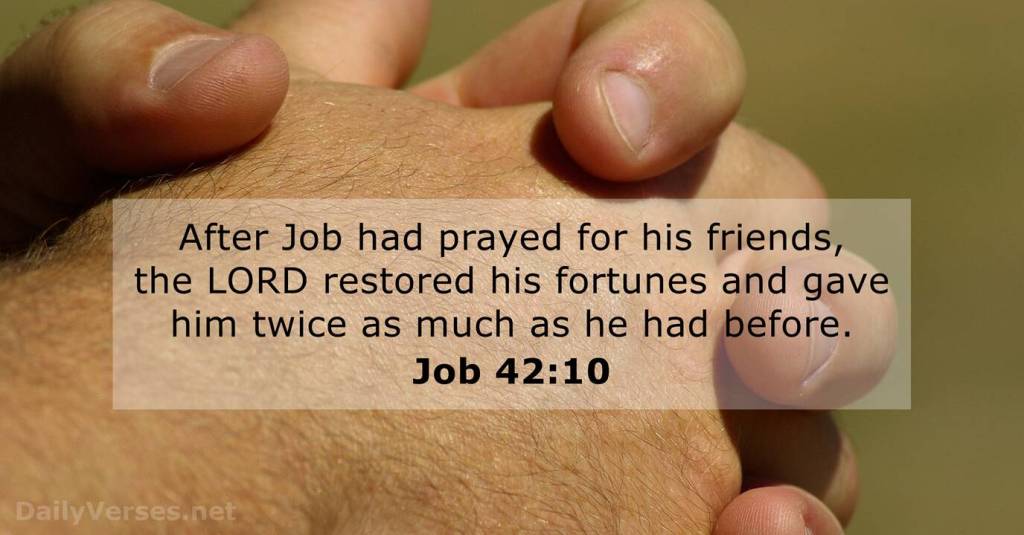
As we conclude our study of the Book of Job and consider how the Lord restored Job to his former prosperity, we need to keep in mind that all Job and the friends knew about God prior to Job’s calamities was what was handed down through oral tradition. In fact, there is no ancient evidence of an alphabet prior to Israel’s coming down to Egypt about the time of Joseph’s reign as second in command to Pharaoh.[1] So, knowledge of such things revealed in the New Covenant scriptures, like God forgiving us is dependent upon our willingness to forgive others (Matthew 6:14-15; cp. Ephesians 4:32), simply wasn’t known or understood in the ancient world. Even if such things were known from the beginning, Paul shows us that that kind of knowledge of God would have been lost to mankind by the time of Job (Romans 1:18-25).
The fact that the Lord gives life to all, and rains down his blessing upon all, whether righteous or unrighteous, requires the character of God to be higher than how he is perceived by man, even by many Christians today. The record of creation, what we are able to see and study, not simply what we find in our Bibles, but understanding the vastness, the power and the wisdom it had to have taken to produce such a universe, demands a kind and gracious God. Therefore, the Lord’s revealing of himself to Job through pointing to his creation, wasn’t completely fulfilled until Job graciously forgave his friends, who had previously labeled him a hypocrite and wicked, evil man. It was only after the evidence of Job’s repentance (Job 42:6) was realized in his reaching out to his friends in forgiveness that the Lord began to restore Job’s former prosperity. The Lord not only forgave Job, but he graciously forgave him, in that he blessed him with twice the wealth he had formerly (Job 42:10).
How did the Lord restore his wealth? Did he do it suddenly by a miracle or by having the Chaldeans and the Sabeans return what they had stolen (cp. Job 1:14-17)? No, it wasn’t like that. Remember, Job’s family and friends had deserted him (Job 19:13-14). The Lord restored Job’s former prosperity through them, by bringing them to Job in repentance of their behavior, and giving him gifts of silver and gold (Job 42:11). So, God not only restored Job’s wealth, but he restored his former relationships with his brethren and friends. In fact, the blessings through Job’s reconciliation with his former associates was so great that Job’s wealth increased to twice what it had been (Job 42:12
Moreover, God gave Job sons and daughters, ten, as many as had been slain (Job 42:13; cp. Job 1:2, 18-19), but this wasn’t to replace them, as God had done with Job’s wealth. A lost child can never be replaced. One can have another child after the death of the first, but that is never a replacement. One still has a lost child, but now one has two, one living and one dead. So, too, was the case with Job, but those who have gone to be with the Lord are never really lost. We shall join them in due time and they, and not another, with be restored to us (cp. Job 19:25-27).
The text records the names of Job’s three daughters (Job 42:14-15, which is somewhat unusual, considering the patriarchal system in which the ancients lived. What I find particularly interesting is the meaning behind the names of his daughters. The first was named Jamima, which means bright as the day or handsome as the day, which seems to point to Job’s new life, which accounts to be greater than his former days. His second daughter was named Kezia from “cassia” an aromatic herb. Finally, Job’s third daughter was named Karenhappuch meaning a horn of cosmetic a beautifier pointing to “the Orientals for coloring the edges of the eyelids, making the eyes large and lustrous” (see ISBE Biblical Dictionary). In other words, Job’s new life took on a luster and beauty that outlived and far exceeded his former reputation (aroma – Kezia).
Finally, Job also went against the patriarchal culture by giving his daughters an inheritance among their brothers. This simply wasn’t done in that age, but Job was a new man, whose reputation had changed from a moralist to a man of gracious endeavor. Truly he was a changed man, and his repentance (Job 42:6) was sincere. He died an old man full of years, walking with the Lord for 140 years after his former life. He lived to see his children’s children, and their children even to the fourth generation (Job 42:16-17).
___________________________________________________
[1] See the excellent YouTube study of the discovery of writing with an alphabet and how this revolutionized mankind’s ability to learn: Patterns of Evidence: The Moses Controversy. Unfortunately, this video can no longer be viewed for free. However, it is still free on Tubi for as long as it is offered there (Patterns of Evidence: The Moses Controversy).
Christian Talk With Georgios Mitrakos
May 22, 2024 at 05:55
Amazing insight. I find the story of job hits people in different ways. For me it speaks to the fact that troubles shouldn’t define us. Job wasn’t being punished for any wrong he did. His sufferings didn’t define his state In fact, they helped prove it. Blessings.
Christian and motivational author. follow @ http://www.christiantalkwithgeorgiosmitrakos.wordpress.com
Eddie
May 22, 2024 at 06:38
Thank you for your kind words. May the Lord richly bless you as well.